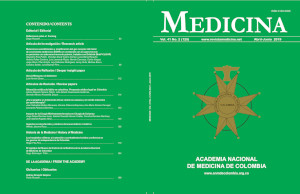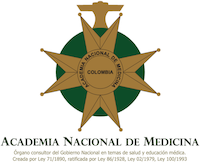¿ES EL JENGIBRE UN TRATAMIENTO EFICAZ CONTRA LAS NÁUSEAS Y EL VÓMITO INDUCIDOS POR QUIMIOTERAPIA?
Palabras clave:
Jengibre, Náusea, Vómito, Efecto Placebo, AntineoplásicosResumen
Las náuseas y el vómito inducidos por la quimioterapia (CINV), constituyen un efecto colateral ampliamente estudiado por su alto impacto sobre la calidad de vida de los pacientes que reciben este tratamiento oncológico. Actualmente están disponibles protocolos para el manejo farmacológico de CINV y adicionalmente, muchos pacientes utilizan de forma empírica alternativas fitoterapéuticas para manejar estos síntomas, entre ellas, el jengibre. Objetivo: La presente revisión tuvo como objetivo responder a la pregunta: ¿Es el jengibre un tratamiento eficaz contra las náuseas y el vómito inducidos por quimioterapia para el cáncer? Método: Se revisaron 14 ensayos aleatorizados con doble ciego y placebo controlado, publicados entre 2012 y 2018, en las bases de datos EMBASE y PubMed. Conclusión: La evidencia clínica disponible es insuficiente para determinar la eficacia del jengibre en la reducción de CINV. Así pues, el uso de jengibre mejora las náuseas y los vómitos en varios pacientes, probablemente debido al efecto placebo.
Biografía del autor/a
Ximena Palacios-Espinosa, Universidad del Rosario
Ana María Gómez-Carvajal, Universidad del Rosario
Juan Sebastián Botero Meneses, Universidad del Rosario
Leonardo Palacios Sánchez, Universidad del Rosario
Referencias bibliográficas
2. Anestin AS, Duouis G, Lanctôt D, Bali M. The Effects of the Bali Yoga Program for Breast Cancer Patients on Chemotherapy-Induced Nausea and Vomiting: Results of a Partially Randomized and Blinded Controlled Trial. J Evid Based Complementary Altern Med. 2017.
3. Satija A, Bhatnagar S. Complementary Therapies for Symptom Management in Cancer Patients. Indian Journal of Palliative Care. 2017; 23(4): 468-79.
4. Frączek P, Kilian-Kita A, Püsküllüoglu M, Krzemieniecki K. Acupuncture as anticancer treatment? Contemporary Oncology. 2017(20):453 - 457.
5. Singletary K. Ginger. Nutrition Today. 2010; 45(4): 171– 83.
6. Sommariva S, Pongiglione B, Tarricone R. Impact of chemotherapy-induced nausea and vomiting on healthrelated quality of life and resource utilization: A systematic review. Critical Reviews in Oncology / Hematology. 2016; 99: 13-36.
7. Singh P, Yoon SS, Kuo B. Nausea: A Review of pathophysiology and therapeutics. Therap Adv Gastroenterol. 2016; 9(1): 98-112.
8. Mukoyama N, Yoshimi A, Goto A, Kotani H, Miyazaki M, Noda Y, et al. An analysis of behavioral and genetic risk factors for chemotherapy-induced nausea and vomiting in Japanese subjects. Biological and Pharmaceutical Bulletin. 2016; 39(11): 1852-8.
9. Stern R. The psychophysiology of nausea. Acta Biol Hung. 2002; 53: 589-99.
10. Gatzoulis MA, Standring S, Borley NR, Collins P, Crossman AR. Gray’s Anatomy: The anatomical basis of clinical practice. Edimburgo: Churchill LivingstoneElsevier; 2008.
11. Miller AD, Leslie RA. The area postrema and vomiting. Front Neuroendocrinol. 1994; 15(4): 301.
12. Kowalski A, Rapps N, Enck P. Functional cortical imaging of nausea and vomiting: A possible approach. Autonomic Neuroscience: Basic and Clinical. 2006; 129: 28-35.
13. Farrell C, Brearley SG, Pilling M, Molassiotis A. The impact of chemotherapy-related nausea on patients’ nutritional status, psychological distress and quality of life. Supportive Care in Cancer. 2013; 21(1): 59-66.
14. Dikken C, Wildman K. Control of nausea and vomiting caused by chemotherapy. Cancer Nursing Practice. 2013; 12(8): 24.
15. Janicki PK. Management of acute and delayed chemotherapy-induced nausea and vomiting: role of netupitant–palonosetron combination. Therapeutics and Clinical Risk Management. 2016(1): 693-699.16. Tamura K, Aiba K, Saeki T, Nakanishi Y, Kamura T, Baba H, et al. Breakthrough chemotherapy-induced nausea and vomiting: report of a nationwide survey by the CINV Study Group of Japan. International Journal of Clinical Oncology. 2017; 22(2): 405-12.
17. Navari RM, Nagy CK, Gray SE. The use of olanzapine versus metoclopramide for the treatment of breakthrough chemotherapy-induced nausea and vomiting in patients receiving highly emetogenic chemotherapy. Supportive Care in Cancer. 2013; 21(6): 1655-63.
18. Stieler JM, Reichardt P, Riess H, Oettle H. Treatment Options for Chemotherapy-Induced Nauseas and Vomiting: Current and Future. American Journal of Cancer. 2003; 2(1): 15-26.
19. Spartinou A, Nyktari V, Papaioannou A. Granisetron: A review of pharmacokinetics and clinical experience in chemotherapy induced - nausea and vomiting. Expert Opin Drug Metab Toxicol. 2017; 13(12): 1289-97.
20. Adel N. Overview of chemotherapy-induced nausea and vomiting and evidence-based therapies. Am J Manag Care. 2017; 23(14): 259-65.
21. Jordan K, Jahn F, Aapro M. Recent developments in the prevention of chemotherapy-induced nausea and vomiting (CINV): a comprehensive review. Annals of Oncology. 2015; 26(6): 1081-90.
22. Viljoen E, Visser J, Koen N, Musekiwa A. A systematic review and meta-analysis of the effect and safety of ginger in the treatment of pregnancy-associated nausea and vomiting. Nutrition Journal. 2014; 13(1).
23. Koçak İ, Yücepur C, Gökler O. Is Ginger Effective in Reducing Post-tonsillectomy Morbidity? A Prospective Randomised Clinical Trial. Clin Exp Otorhinolaryngol. 2017.
24. Sontakke S, Thawani V, Naik MS. Ginger as an antiemetic in nausea and vomiting induced by chemotherapy: A randomized, cross-over, double blind study. Indian Journal of Pharmacology. 2003; 35(1): 32-6.
25. Hori Y, Miura T, Hirai Y, Fukumura M, Nemoto Y, Toriizuka K, et al. Pharmacognostic studies on ginger and related drugs—part 1: five sulfonated compounds from Zingiberis rhizome (Shokyo). Phytochemistry. 2003; 62: 613-617.
26. Giacosa A, Morazzoni P, Bombardelli E, Riva A, Porro GB, Rondanelli M. Can nausea and vomiting be treated with ginger extract? European Review for Medical and Pharmacological Sciences. 2015; 19(7): 1291-6.
27. Wampold BE, Frost ND, Yulish NE. (2016). Placebo Effects in Psychotherapy: A Flawed Concept and a Contorted History. Psychology of Consciousness: Theory, Research, and Practice. 2016; 3(2): 108–120
28. Wampold BE, Minami T, Tierney SC, Baskin TW, Bhati KS. The placebo is powerful: Estimating placebo effects in medicine and psychotherapy from randomized clinical trials. Journal of Clinical Psychology. 2005; 61(7): 835- 54.
29. Haug M. Explaining the placebo effect: Aliefs, beliefs, and conditioning. Philosophical Psychology. 2011; 24(5): 679-98.
30. Kirsch I. Placebos Handbook of Psychology - Health and Medicine. New York: Cambridge University Press; 2007.
31. Beecher HK. The powerfull placebo. JAMA. 1955; 159(17): 1602 - 6.
32. Kienle GS, Kiene H. The powerful placebo effect: Fact or fiction? Journal of Clinical Epidemiology. 1997; 50(12): 1311-8.
33. Darragh M, Booth RJ, Consedine NS. Who responds to placebos? Considering the “placebo personality” via a transactional model. Psychology, Health & Medicine. 2015; 20(3): 287-95.
34. Hall KT, Lembo AJ, Kirsch I, Ziogas DC, Douaiher J, Jensen KB, et al. Catechol-O-Methyltransferase val158met Polymorphism Predicts Placebo Effect in Irritable Bowel Syndrome. PLoS ONE. 2012; 7(10): 1-6.
35. Dodd S, Dean OM, Vian J, Berk M. Review: A Review of the Theoretical and Biological Understanding of the Nocebo and Placebo Phenomena. Clinical Therapeutics. 2017; 39: 469-76.
36. Meyer B, Yuen KSL, Büchel C, Kalisch R, Ertl M, Polomac N, et al. Neural mechanisms of placebo anxiolysis. Journal of Neuroscience. 2015; 35(19): 7365-73.
37. Li X, Qin Y, Liu W, Zhou XY, Li YN, Wang LY. Efficacy of Ginger in Ameliorating Acute and Delayed Chemotherapy-Induced Nausea and Vomiting Among Patients with Lung Cancer Receiving Cisplatin-Based Regimens: A Randomized Controlled Trial. Integrative Cancer Therapies. 2018; 17(3): 747-754. doi: 10.1177/1534735417753541.
38. Marx W, McCarthy A, Ried K, McKavanagh D, Vitetta L, Sali A, Lohning A, Isenring E. The Effect of a Standardized Ginger Extract on Chemotherapy-Induced NauseaRelated Quality of Life in Patients Undergoing Moderately or Highly Emetogenic Chemotherapy: A Double Blind, Randomized, Placebo Controlled Trial. Nutrients. 2017; 9: 867. doi:10.3390/nu9080867
39. Bossi P, Alfieri S, Granata R, Bergamini C, Cortinovis D, Bidoli P, et al. A randomized, double-blind, placebocontrolled, multicenter study of a ginger extract in the management of chemotherapy-induced nausea and vomiting (CINV) in patients receiving high-dose cisplatin. Annals of Oncology. 2017; 28(10): 2547-51.
40. Konmun J, Danwilai K, Ngamphaiboon N, Sookprasert A, Sripanidkulchai B, Subongkot S. A phase II randomized double-blind placebo-controlled study of 6-gingerol as an anti-emetic in solid tumor patients receiving moderately to highly emetogenic chemotherapy. Medical Oncology. 2017; 34(4).41. Shokri F, Gharebaghi PM, Esfahani A, Sayyah-Melli, M., Shobeiri MJ, et al. Comparison of the complications of platinum-based adjuvant chemotherapy with and without ginger in a pilot study on ovarian cancer patients. International Journal of Women’s Health and Reproduction Sciences. 2017; 5(4): 324-31.
42. Thamlikitkul L, Srimuninnimit V, Akewanlop C, Ithimakin S, Techawathanawanna S, Korphaisarn K, et al. Efficacy of ginger for prophylaxis of chemotherapy-induced nausea and vomiting in breast cancer patients receiving adriamycin–cyclophosphamide regimen: a randomized, double-blind, placebo-controlled, crossover study. Supportive Care in Cancer. 2017; 25(2): 459-64.
43. Ansari M, Porouhan P, Omidvari S, Ahmadloo N, Nasrollahi H, Hamedi SH, et al. Efficacy of ginger in control of chemotherapy induced nausea and vomiting in breast cancer patients receiving doxorubicin- based chemotherapy. Asian Pacific Journal of Cancer Prevention. 2016; 17(8): 3875-8.
44. Sanaati F, Najafi S, Kashaninia Z, Sadeghi M. Effect of ginger and chamomile on nausea and vomiting caused by chemotherapy in Iranian women with breast cancer. Asian Pacific Journal of Cancer Prevention. 2016; 17(8): 4127-31.
45. Liu YQ, Sun S, Dong HJ, Zhai DX, Zhang DY, Shen W, et al. Wrist-ankle acupuncture and ginger moxibustion for preventing gastrointestinal reactions to chemotherapy: A randomized controlled trial. Chinese Journal of Integrative Medicine. 2015; 21(9): 697-702.
46. Lua PL, Salihah N, Mazlan N. Effects of inhaled ginger aromatherapy on chemotherapy-induced nausea and vomiting and health-related quality of life in women with breast cancer. Complementary Therapies in Medicine. 2015; 23: 396-404.
47. Arslan M, Ozdemir L. Oral Intake of Ginger for Chemotherapy-Induced Nausea and Vomiting Among Women with Breast Cancer. Clinical Journal of Oncology Nursing. 2015; 19(5): E92-E7.
48. Marx W, Isenring L, Ried K, Sali A, McCarthy AL, Vitetta L, et al. Can ginger ameliorate chemotherapy-induced nausea? Protocol of a randomized double blind, placebo-controlled trial. BMC Complementary and Alternative Medicine. 2014; 14.
49. Panahi Y, Saadat A, Sahebkar A, Hashemian F, Taghikhani M, Abolhasani E. Effect of ginger on acute and delayed chemotherapy-induced nausea and vomiting: A pilot, randomized, open-label clinical trial. Integrative Cancer Therapies. 2012; 11(3): 204-11.
50. Ryan JL, Heckler CE, Roscoe JA, Hickok JT, Morrow GR, Dakhil SR, et al. Ginger (Zingiber officinale) reduces acute chemotherapy-induced nausea: a URCC CCOP study of 576 patients. Supportive Care in Cancer. 2012; 20(7): 1479-89.
51. Marx W, McCarthy A, Marshall S, Crichton M, Molassiotis A, Ried K, Bird R, Lohning A, Isenring E. Supplemental prophylactic intervention for chemotherapy-induced nausea and emesis (SPICE) trial: Protocol for a multicentre double-blind placebo controlled randomised trial. Nutrition & Dietetics. 2018. DOI: 10.1111/1747- 0080.12446
52. Lee J, Oh H. Ginger as an Antiemetic Modality for Chemotherapy-Induced Nausea and Vomiting: A Systematic Review and Meta-Analysis. Oncology Nursing Forum. 2013; 40(2): 163-70.
53. Ernst E, Pittler MH. Efficacy of ginger for nausea and vomiting: A systematic review of randomized clinical trials. British Journal of Anaesthesia. 2000; 84(3): 367-71.
54. Ali BH, Blunden G, Tanira MO, Nemmar A. Some phytochemical, pharmacological and toxicological properties of ginger (Zingiber officinale Roscoe): A review of recent research. Food and Chemical Toxicology. 2008. 46: 409–420.
Cómo citar
Descargas
Publicado
Número
Sección
Licencia
Copyright
ANM de Colombia
Los autores deben declarar revisión, validación y aprobación para publicación del manuscrito, además de la cesión de los derechos patrimoniales de publicación, mediante un documento que debe ser enviado antes de la aparición del escrito. Puede solicitar el formato a través del correo revistamedicina@anmdecolombia.org.co o descargarlo directamente Documento Garantías y cesión de derechos.docx
Copyright
ANM de Colombia
Authors must state that they reviewed, validated and approved the manuscript's publication. Moreover, they must sign a model release that should be sent.




